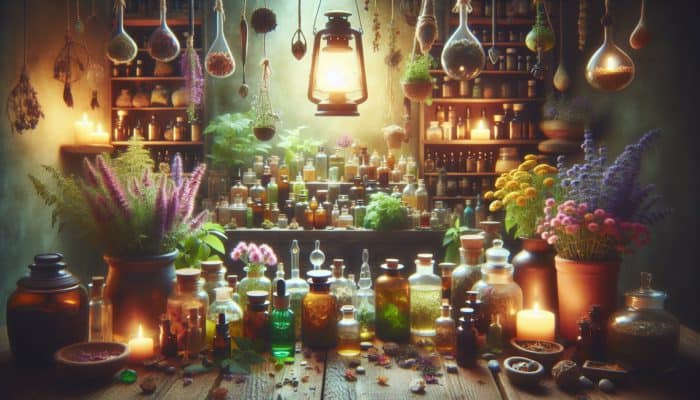Harnessing the Healing Potential of Herbal Remedies for Enhanced Well-being
Exploring the Numerous Advantages of Powerful Herbs

Understanding and recognising potent herbs is a vital component of your journey toward discovering safe and effective herbal remedies that can significantly enhance your overall well-being. Numerous herbs possess remarkable properties that can yield powerful effects, which may lead to negative reactions if not approached with the necessary respect and caution. For instance, St. John’s Wort is frequently celebrated as a natural solution for mood disorders, yet it is known to interact with various pharmaceutical medications, potentially resulting in harmful side effects. By identifying and comprehending which herbs possess such notable potency, you can substantially diminish the risks associated with their misuse, assuring a safer and more beneficial experience with herbal remedies.
An excellent starting point in your exploration of herbs is to delve into the most commonly utilised herbs that are highly regarded within your local community or recommended by experienced herbalists. Many herbal shops across the UK provide invaluable resources and expert guidance on recognising a diverse range of herbs. This foundational knowledge empowers you to make informed decisions, enabling you to discern which herbs necessitate careful handling due to their strength and potential interactions with other substances, thus fostering a more responsible approach to your herbal practices.
Furthermore, maintaining a comprehensive herb journal can dramatically enhance your understanding of herbal potency and its effects on your body. By documenting your experiences with various herbs—observing their effects and any reactions you may encounter—you create a personal reference that serves not only your future usage but also the benefit of others in your community. Sharing this record promotes collective learning and safety among those who share an interest in herbal remedies, fostering a supportive environment for herbal exploration.
Exploring the Distinct Effects of Powerful Herbs
The effects of potent herbs can vary significantly from one individual to another, influenced by a multitude of factors such as body weight, metabolic rate, and pre-existing health conditions. For example, while some individuals may find that a small dose of valerian root encourages restful sleep, others may experience increased anxiety from the same dosage. This remarkable variability highlights the importance of gaining a thorough understanding of the effects of these herbs, ensuring their safe and effective use for everyone.
Research indicates that potent herbs can have significant impacts on various bodily systems, including the nervous system and immune response. For instance, ginseng is commonly used for its energy-boosting and immune-enhancing properties; however, excessive consumption can result in insomnia or elevated blood pressure. By comprehensively understanding these effects, you can navigate appropriate dosages effectively, ensuring that you harness the benefits of these herbs while minimising the risk of overdose or adverse reactions.
Consulting with a qualified healthcare provider or a knowledgeable herbalist can provide personalised insights into how specific herbs may uniquely affect your body. They can offer tailored advice regarding safe usage, making your exploration of herbal remedies not only safer but also more enjoyable and effective in achieving your health objectives and wellness goals.
The Importance of Seeking Guidance from Herbal Experts
Prioritising consultations with seasoned herbal professionals is an essential strategy in preventing herbal overdoses and ensuring safe practices. While a vast array of information about herbal remedies is readily available online, the reliability and accuracy of these sources can vary considerably. Engaging directly with herbalists and healthcare professionals can provide you with personalised guidance based on your unique health history, lifestyle, and any medications you may currently be taking, ensuring a more tailored and effective approach to your herbal journey.
Across the UK, a multitude of practitioners offer consultations either in person or through online platforms, delivering accessible advice tailored specifically to your individual needs. This specialised guidance can be invaluable, particularly when considering herbs that might interact with prescribed medications, helping you avoid potentially dangerous combinations that could jeopardise your health and well-being.
Moreover, participating in workshops led by herbal experts can significantly broaden your understanding of herbal potency and safe usage practices. These events typically cover essential topics such as identifying potent herbs, understanding accurate dosing, and implementing best practices for safe usage. Engaging with a community that shares a passion for herbalism also fosters a sense of support and shared experiences, enriching your overall learning journey and promoting a deeper appreciation for herbal remedies.
Effectively Assessing the Potency of Herbal Remedies

Evaluating the potency of herbs is crucial for their safe and effective use in your health regimen. Several methods can assist you in assessing the strength of the herbs you intend to use. One effective approach is sourcing your herbs from reputable sellers who provide comprehensive details about their products. High-quality herbal suppliers often offer laboratory analyses or third-party testing results, ensuring transparency and instilling confidence in your purchasing decisions, thus supporting responsible herbal practices.
Additionally, developing the ability to identify the colour, aroma, and texture of herbs can significantly aid in determining their freshness and potency. For instance, herbs like echinacea should emit a distinctive scent and display vibrant colours, indicating their quality and effectiveness. Observing these sensory characteristics can help ensure that you are using potent and beneficial herbs in your health practices.
Moreover, beginning your herbal exploration with tinctures or extracts can be an effective way to gauge potency. These concentrated forms typically come with specific dosing instructions, making it easier for you to monitor your body's response. Therefore, employing a systematic approach to assessing herb potency is crucial in preventing herbal overdoses and ensuring a positive experience with herbal remedies, ultimately supporting better health outcomes.
Comprehensive Guidelines for Safe Herbal Dosage Practices
Recognising the Importance of Thoroughly Reviewing Labels
The significance of diligently reading labels cannot be overstated when it comes to herbal products. Each product typically includes recommended dosages crafted to ensure both safety and efficacy. Failing to adhere to these guidelines can lead to unintentional overdoses, with severe repercussions on your health and overall well-being, potentially causing long-lasting harm.
Take the time to familiarise yourself with the labelling conventions utilised by different herbal brands. For instance, dosage instructions on herbal supplements may differ significantly from those provided for herbal teas or tinctures. Understanding these distinctions can prevent you from inadvertently doubling your intake or miscalculating your dosage, thus ensuring a safer and more effective experience with herbal remedies that contribute positively to your health journey.
Furthermore, look for certifications and quality indicators on the labels of herbal products. In the UK, numerous products carry seals indicating they have undergone testing for quality and safety. These certifications provide reassurance that you are consuming a product that meets industry standards, thereby further mitigating the risk of overdosing or experiencing adverse effects related to improper usage.
Starting Your Herbal Exploration with Cautious Low Doses

Embarking on your herbal journey with low doses is a wise and prudent approach to ensure safety and efficacy. Each individual reacts differently to herbs, and starting with a small quantity allows you to gauge how your body responds without overwhelming it. This careful introduction can help establish a secure foundation for safe herbal usage, enabling you to build a positive relationship with herbal remedies over time.
For instance, if you are new to using chamomile for relaxation, it is advisable to begin with a single cup of tea before gradually increasing your intake. This methodical approach enables you to identify any sensitivities or adverse reactions that you may experience with the herb while ensuring that you remain within safe limits.
Additionally, documenting your experiences with low doses can provide clarity on what works best for you. By keeping track of your reactions—whether they are positive or negative—you can create a personal herbal guide that may also benefit others seeking similar remedies, fostering a community of responsible herbal usage and encouraging informed decisions among peers.
Gradually Adjusting Dosage for Maximum Benefits
As you become more attuned to how your body reacts to specific herbs, gradually adjusting your dosage over time can be highly advantageous. This incremental increase allows you to find your personal ‘sweet spot,' optimising the benefits of the herbs while avoiding the risk of surpassing safe limits, thereby ensuring a more effective experience with herbal remedies.
Consulting with a qualified herbalist during this phase can be particularly beneficial. They can help you understand appropriate increases based on your health goals and overall well-being. For example, if you are using ashwagandha to manage stress, a professional can offer guidance on how to scale your intake effectively and safely, ensuring you achieve the desired outcomes without compromising your health.
Additionally, listening to your body is paramount during this adjustment period. Be attentive to any changes in how you feel and be prepared to modify your dosage accordingly. This mindful approach ensures that you remain within safe limits while maximising the therapeutic potential of the herbs you are using, ultimately enhancing your health and wellness journey.
Recognising Symptoms of Herbal Overdose for Timely Action
Identifying Common Symptoms Associated with Herbal Overdose
Recognising the symptoms of an herbal overdose is critical for timely intervention and care. Common signs may include nausea, dizziness, and palpitations, which can manifest quickly after consuming excessive amounts of a herbal remedy. Being able to identify these symptoms empowers you to take swift action if you or someone else begins to experience them, preventing further complications and promoting safety.
For example, if you feel lightheaded after consuming a larger dose of ginger for digestive support, it is crucial to acknowledge that this may be a potential sign of overdose. Understanding these indicators can help you respond appropriately and seek assistance if necessary, safeguarding your health and well-being.
Moreover, different herbs may exhibit unique symptoms of overdose. For instance, excessive intake of kava can lead to skin rashes and potential liver-related issues. Being aware of these specific signs will enable you to respond effectively and obtain medical help when needed, ensuring your safety and promoting a responsible approach to herbal usage.
Immediate Actions to Take in Case of Suspected Overdose
Knowing the appropriate steps to take in the event of a suspected herbal overdose is vital for your safety and well-being. The first action is to cease consumption of the herb immediately. Assess the symptoms; if they are severe, do not hesitate to contact emergency services or proceed to your nearest medical facility for assistance.
While waiting for medical help, it is essential to remain calm and provide as much information as possible about the herbal product consumed, including the dosage and timing of ingestion. This information can greatly aid healthcare professionals in delivering the appropriate treatment and care tailored to your situation, ensuring a more effective response to your needs.
Additionally, keeping emergency contacts readily accessible, including your local poison control centre, can be invaluable. Being prepared to act decisively in the face of a potential overdose is an essential aspect of responsible herbal practices, potentially saving lives and preventing serious health complications through prompt action and informed decision-making.
Long-term Health Consequences Associated with Herbal Overdoses
Repeated herbal overdoses can lead to long-term health consequences that may not be immediately apparent. For instance, consistent overuse of certain herbs like liquorice can result in high blood pressure or electrolyte imbalances over time. Recognising these potential ramifications encourages a more cautious approach to using herbal remedies, advocating for responsible consumption and awareness of long-term effects.
It is essential to consider not only the immediate effects of herbs but also the long-term impact they may have on your health. Awareness of these risks fosters a more responsible attitude toward herbal usage, ensuring that your health remains a priority and that you are making informed choices in your herbal practices.
Moreover, engaging in regular health check-ups can help monitor any underlying issues that may arise from herbal overdoses. Discussing your herbal usage with your healthcare provider ensures that any potential complications are addressed promptly, keeping you on the path to better health and wellness, and supporting your long-term well-being.
Best Practices for Safely Storing Herbs
Ensuring Herbs are Out of Reach of Children and Pets for Enhanced Safety
Properly storing herbs is a fundamental aspect of preventing accidental overdoses, particularly in households with children or pets. It is vital to ensure that all herbal products are kept out of sight and reach of young individuals. Taking these precautions can significantly reduce the risks associated with accidental ingestion of potentially harmful substances, fostering a safer environment for everyone.
Consider utilising high cabinets or locking storage boxes to prevent tampering. This measure not only protects children but also pets, who may be curious and tempted to nibble on herbal products. Being aware of your surroundings and implementing these safety measures can significantly mitigate potential hazards, creating a secure home environment for all family members.
Furthermore, it is essential to educate your family about the potential dangers associated with herbal overdoses. Open discussions about the importance of safety in herbal usage can foster a culture of awareness and caution within your home, promoting a safer environment for all individuals present.
Implementing Clear Labelling for Herbal Containers
Clear labelling of herbal containers is crucial in preventing mix-ups that might lead to overdoses or unwanted effects. Each jar or bottle should clearly indicate the name of the herb, its potency, and any specific usage instructions. This transparency ensures that everyone in the household is aware of the contents and their appropriate applications, reducing the likelihood of accidental misuse and promoting responsible herbal usage practices.
Implementing a colour-coding system can also enhance safety. For instance, using red labels for highly potent herbs and green labels for milder varieties can serve as immediate visual cues. This method makes it easier to identify herbs quickly, reducing the likelihood of unintentional consumption and promoting a responsible approach to herbal usage.
Moreover, consider labelling containers with expiry dates. Herbs can lose their potency over time, necessitating higher doses to achieve the desired effects. By keeping track of expiration dates, you can ensure that you are using herbs that are both safe and effective, further contributing to responsible herbal practices and the well-being of everyone involved.
Optimal Storage Conditions to Preserve Herbal Quality
Maintaining the quality of herbs requires appropriate storage conditions to preserve their potency and prevent degradation. Store your herbs in cool, dry places, as excessive heat or humidity can lead to the growth of mould or the breakdown of active compounds, rendering them ineffective or potentially harmful to health.
Utilising a dedicated herb drawer or a cool pantry can create an ideal environment for storage. Avoid placing herbs near stoves or sinks where temperature fluctuations occur, as these can compromise their quality over time, potentially leading to spoilage or reduced efficacy.
Additionally, consider incorporating silica gel packets or desiccants within your storage containers to absorb any excess moisture. This extra precaution can significantly help maintain the quality and efficacy of your herbs, thus supporting safe and effective herbal practices for everyone involved in your wellness journey.
Utilising Airtight Containers for Optimal Preservation
To protect herbs from moisture and air exposure, it is advisable to use airtight containers for storage. Exposure to air can lead to oxidation, a process that diminishes the efficacy of your herbs over time. By keeping your herbs sealed, you can considerably extend their shelf life while maintaining their potency and effectiveness for your health and wellness.
Glass jars with tight-fitting lids are excellent choices for this purpose. They not only prevent exposure to air but also provide a non-reactive environment, crucial for preserving the integrity of herbal compounds and ensuring that you are getting the most out of your herbal remedies.
Additionally, while purchasing herbs in bulk can be economical, it is important to be mindful of how you store excess quantities. Dividing larger amounts into smaller airtight containers allows you to open only what you need at any given time, thereby protecting the remainder from exposure and degradation, ultimately supporting better health outcomes and ensuring the longevity of your herbal supplies.
Safely Combining Herbal Remedies for Enhanced Benefits
Understanding Potential Interactions Among Different Herbs
Understanding how different herbs interact is vital for preventing unintended overdoses and maximising the benefits of herbal remedies. Certain herbs can amplify each other’s effects, leading to increased potency that may not be immediately apparent. For instance, combining ginger with blood-thinning herbs like garlic can heighten the risk of bleeding due to their synergistic effects. Recognising these interactions allows for more informed and cautious use of herbal remedies, safeguarding your health in the process.
A comprehensive understanding of these interactions can empower you to make informed choices when combining herbs. Researching well-established combinations and their effects can guide you effectively towards safer herbal practices, reducing the likelihood of adverse reactions or complications, and enabling you to harness the full potential of each herb you use.
Moreover, keeping a herbal journal documenting your experiences with various herb combinations can serve as a helpful reference. This personal database can clarify which combinations yield beneficial results for you and which may not, thus promoting a safer and more effective approach to herbal use that you can share with others who are interested in similar remedies.
Avoiding Known Harmful Combinations of Herbs
Steering clear of known harmful combinations is a critical aspect of safe herbal practice. For example, mixing St. John’s Wort with antidepressants can result in severe side effects due to its interaction with neurotransmitters. Awareness of these interactions can protect you from potential risks associated with combining certain herbs and ensure that you are using herbal remedies wisely, prioritising your health and well-being.
Staying informed about which combinations to avoid is essential for safeguarding your health. Educational resources, including reputable books and online platforms, can provide valuable insights into which herbs should not be mixed, allowing for a more informed approach to herbal remedies that prioritises safety and responsible usage.
Additionally, seeking advice from a professional herbalist before trying new combinations can further enhance safety. Their expertise can guide you through the complexities of herbal interactions effectively, ensuring that your herbal journey remains beneficial rather than hazardous, ultimately contributing to better health outcomes and promoting a safe approach to herbalism.
Consulting Professionals for Safe Herb Combinations
Consultation with healthcare providers before combining different herbs is paramount for ensuring safety. A professional can assess your health history and current medication regimen, identifying any potential risks associated with certain combinations. This proactive approach can safeguard your health and well-being, ensuring that you can enjoy the benefits of herbal remedies without adverse effects or complications.
In the UK, many herbalists are trained in both traditional and contemporary herbal practices, offering a wealth of knowledge on safe combinations. Furthermore, the availability of online consultations has made it easier than ever to access professional guidance, regardless of your location or circumstances, promoting safer herbal usage for everyone interested in exploring herbal remedies.
Moreover, engaging in community forums or local herbal groups can provide avenues for sharing experiences and knowledge. These networks can offer anecdotal evidence regarding safe combinations and best practices, allowing you to learn from others while still prioritising professional advice and guidance, creating a supportive community around herbalism that fosters collective learning and safety.
Advancing Education and Awareness Around Herbal Safety
Staying Informed About Herbal Safety Practices
Keeping up with the latest information on herbal safety is essential for anyone interested in utilising herbal remedies. The field of herbal knowledge is constantly evolving, with new research emerging regularly that can affect how we view and use various herbs. Staying updated helps ensure that you are using herbal remedies safely and effectively, maximising their benefits while minimising potential risks.
Subscribing to reputable herbal newsletters or following recognised experts on social media can provide valuable insights and updates on the latest findings and safety practices. These resources often share essential safety guidelines, usage recommendations, and emerging trends that can enhance your understanding and application of herbal remedies in your daily life, empowering you to make informed decisions.
Moreover, investing time in reading books or attending workshops dedicated to herbal safety can deepen your understanding of herbal practices. Hands-on learning experiences provide practical skills that are crucial for safe herb usage, allowing you to engage more fully with herbal practices and maximise your benefits through informed usage and responsible practices.
Participating in Workshops for Enhanced Herbal Knowledge
Participating in workshops or seminars focused on herbal medicine can significantly broaden your knowledge base and skill set. These events often cover a wide range of topics, from safe usage to identification and dosage guidelines, all presented by experts in the field who can answer your questions and provide tailored advice.
Local herbal shops or community centres frequently host these workshops, making them accessible to those interested in expanding their understanding of herbal practices. Engaging in hands-on activities during these sessions can solidify your learning, providing practical insights alongside theoretical knowledge that you can apply in your own herbal journey, enhancing both safety and effectiveness.
Furthermore, networking with fellow participants can foster a sense of community, allowing you to share experiences and learn from each other. This communal approach enriches the learning experience and promotes ongoing education and awareness within the realm of herbal safety, creating a supportive atmosphere for everyone involved in the pursuit of herbal knowledge and safe practices.
Sharing Knowledge Responsibly for Greater Community Awareness
Educating others about the risks associated with herbal overdoses and the importance of safe practices is a commendable endeavour that can make a significant impact on community health. Whether you are sharing your personal experiences with friends, family, or community groups, spreading awareness plays a key role in preventing unintentional overdoses and promoting safe herbal use among all individuals.
Consider creating informative materials or hosting small discussion groups to share your knowledge effectively. The goal is to empower others with valuable information while ensuring they understand the responsibility that accompanies herbal usage and the potential risks involved, fostering a culture of safety and awareness within your community.
Additionally, engaging in online discussions or writing articles focused on herbal safety can help reach a broader audience. Leveraging social media platforms to disseminate credible information can initiate discussions that lead to heightened awareness and understanding within the community, promoting a culture of safety and responsibility that benefits everyone.
Frequently Asked Questions about Safe Herbal Usage
Which herbs are renowned for their potency and require caution?
Some of the most potent herbs to consider include St. John’s Wort, valerian root, and kava. Each of these herbs possesses unique effects and potential interactions with other substances, making it imperative to handle them with care and knowledge to avoid adverse effects and ensure safe usage practices.
How can I determine the appropriate dosage for herbal remedies?
Start with the lowest recommended dosage indicated on the product label and closely monitor your body’s response. If necessary, consider gradually increasing the dose while remaining vigilant about any adverse reactions. Consulting with a healthcare professional is also advisable for personalised guidance on herbal usage and dosage recommendations.
What are the common symptoms associated with herbal overdose?
Common symptoms of an herbal overdose may include nausea, dizziness, palpitations, and gastrointestinal distress. Recognising these signs early can enable you to take appropriate and swift action to prevent further complications, ensuring your safety and well-being.
What should I do if I suspect an overdose has occurred?
Cease taking the herbal remedy immediately and assess your symptoms. If symptoms are severe, seek medical help without delay. Providing detailed information about the herb consumed can assist healthcare professionals in delivering the appropriate response and care tailored to your situation, ensuring a more effective approach to your health needs.
How should I safely store my herbs to prevent mishaps?
Store herbs in airtight containers kept in a cool, dry place away from children and pets. Proper labelling is also essential to avoid mix-ups and ensure safe usage, promoting responsible herbal practices that safeguard health and well-being.
Are there specific herbs that should not be combined?
Yes, certain herbs, such as St. John’s Wort, should not be combined with antidepressants due to potential adverse interactions. Always consult a healthcare professional before attempting to mix herbs to ensure safety and avoid complications that could jeopardise your health and wellness.
How can I educate others about herbal safety effectively?
Share your experiences and knowledge through discussions, workshops, or online platforms. Creating informative materials or articles can also foster awareness and understanding among peers and the wider community, promoting a culture of safety and responsible herbal usage.
What resources are available for learning about herbal safety practices?
Books, reputable websites, and local workshops are excellent resources for learning about herbal safety. Following experts in herbalism on social media can also keep you updated on the latest safety practices and guidelines for responsible usage, empowering you to make informed choices.
Can I safely use herbs while on medication?
It is crucial to consult with a healthcare professional before using herbs in conjunction with medications, as some may interact negatively and lead to health complications that can be dangerous or detrimental to your overall health.
What are the potential long-term effects of herbal overdoses?
Long-term overdoses can result in serious health issues, including organ damage, hormonal imbalances, and increased susceptibility to infections. Monitoring your usage is essential for maintaining safety and promoting overall health through responsible herbal practices.
Connect with us on Facebook for more insights!
The Article: How to Avoid Herbal Overdoses: A Safe Guide appeared first on https://mcrtherapies.co.uk
The Article Avoid Herbal Overdoses: Your Essential Safety Guide Was Found On https://limitsofstrategy.com

